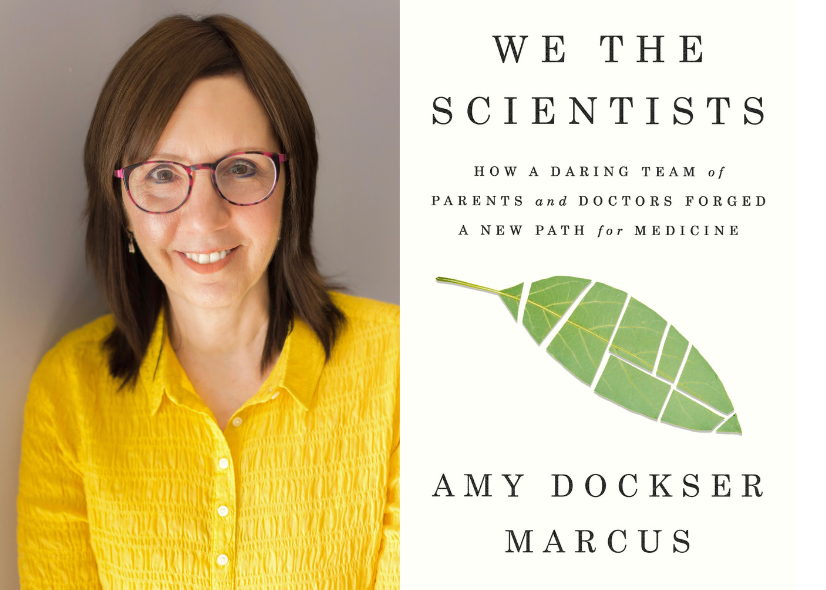RARE Advocacy Summit 2023: Amy Marcus Discusses How Patients are Changing Research and Drug Development
June 28, 2023
Amy Dockser Marcus will be a keynote speaker at the 2023 RARE Advocacy Summit in San Diego, California, September 19-21.
by Danny Levine
Amy Dockser Marcus, in her book We the Scientists, tells the story of a group of parents of children diagnosed with the rare and fatal genetic lysosomal storage disorder Niemann-Pick disease type C. When they were confronted with the fact that no treatment existed or would likely be developed in time to save the lives of their kids, they began collaborating with themselves, researchers, and physicians to accelerate the path to a treatment.
While the book chronicles the active role these families took in the drug development process as citizen scientists, it also chronicles a broader change in the way biomedical research is conducted.
Marcus, a Pulitzer Prize-winning health and science reporter for The Wall Street Journal, will deliver the keynote address at Global Genes’ 12th Annual RARE Patient Advocacy Summit, one of the world’s largest gatherings of the rare disease community. The event is an opportunity for advocates to learn, network, and inspire each other as they interact with researchers, healthcare professionals, drug developers and other advocates during the three-day event that runs September 19 through 21 at the Sheraton San Diego Hotel & Marina on Harbor Island Drive in San Diego.
The Summit anchors Global Genes’ Week in RARE, a series of events that will take place at the venue including the RARE Health Equity Forum, the RARE Champions of Hope Awards, and the Global Advocacy Alliance Meeting and the RARE Corporate Alliance Meeting.

Marcus said her interest in the world of rare disease advocacy began when her mother was diagnosed with a rare cancer, and she learned that despite all the advances in treatments no one was doing work on her mother’s form of cancer. She said she experienced some of the frustrations that family members and patients often face when they realize that there’s just not a lot going on with drug development in an effort to try to save their loved ones. Though her mother died, Marcus continued to immerse herself in the world of rare diseases and patient advocacy and she focused her research and writing in that area.
After meeting some members of the Nieman-Pick type C patient community, she became interested in their efforts to try to form an innovative collaboration that would accelerate drug development for the condition. At the time, there was also a group of scientists who recognized the need for new approaches that involved collaborating with patients and their families on drug development.
“What’s emerged in recent years is an understanding that patients themselves, advocates, and families also have ideas for experiments to run—that they are going to be the producers of scientific knowledge, not only the beneficiaries or the consumers of scientific knowledge. They’re going to devise ideas, collaborate with one another, set up models and all of that,” said Marcus. “This notion that the patients and the advocates are going to drive science and initiate science requires new thinking, potentially requires new ways of regulating things, or ensuring that there’s ethical protections, requires new thinking about how to negotiate when people disagree, whether it’s patients and advocates among themselves or scientists with each other. That’s such a fascinating and important lesson that the book focuses on and that other groups are focusing on as well.”
Marcus said that patient-centered drug development is essential and has taken hold in people’s minds, but she doesn’t think we are fully there yet. She said there are family-driven groups are sharing their findings with other parent groups, forming coalitions with each other to try to develop best practices, posting things online so that people don’t have to reinvent the wheel when they wake up with a devastating diagnosis for their children one day.
“The NIH, the FDA, and funders should think of parents and families as scientists and try to help fund them, train them, and make them even better scientists than they are even now,” said Marcus, who would like to see efforts made to help patients do good science and be treated as equal partners. “If those notions take hold, I think you’re going to see more and more families getting involved with this and really pushing forth and changing the drug development landscape, as well as the rare disease landscape.”
Global Genes’ 12th Annual RARE Patient Advocacy Summit is one of the world’s largest gatherings of the rare disease community. The event is an opportunity for advocates to learn, network, and inspire each other as they interact with researchers, healthcare professionals, drug developers and other advocates during the three-day event that runs September 19 through 21 at the Sheraton San Diego Hotel & Marina on Harbor Island Drive in San Diego. RARE Advocacy Summit is part of Global Genes’ Week in RARE, and will be preceded by the RARE Health Equity Forum, September 18 and 19.

Stay Connected
Sign up for updates straight to your inbox.
